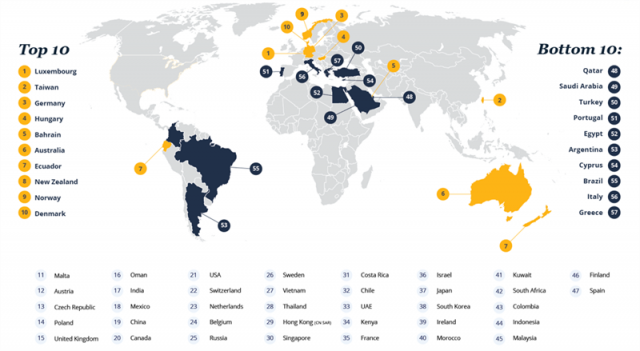
Munich, 07 March 2017 — Almost half of the women who currently live abroad (46 percent) mentioned their job or business as a reason for expatriating. This share is still lower than among their male counterparts, of which seven out of ten (71 percent) say the same. Nonetheless, it is the factor most often given by expat women, followed by 33 percent who moved for their partner and 26 percent who were looking for an adventure. Based on the insights of more than 6,000 women given in the annual Expat Insider survey, InterNations, the world’s largest network for people who live and work abroad, compiled a so-far unpublished ranking of the top countries for women working abroad, which varies quite a bit from male expats’ picks. Luxembourg, Taiwan, and Germany top the chart, and they all do particularly well for women’s job security. More surprisingly, Hungary and Bahrain follow just behind in the top five, performing extremely well for job satisfaction and career opportunities for women — as opposed to the more negative perception of men working in these countries.
Top 10 Countries for Women Working Abroad
1. Luxembourg
Luxembourg tops the Working Abroad Index not only for women, but for all survey respondents. For female expats, it does best in the Job Security subcategory, coming in first with 86 percent of women saying that they feel positive about this factor. The high ranking in job security is partly due to the 93 percent of female expats that feel positive about the state of Luxembourg’s economy. The country also ranks first among women when it comes to the Safety & Security subcategory: 96 percent rate the peacefulness positively, and not one expat women says that they feel negatively about the country’s political stability.
2. Taiwan
Taiwan takes second place overall for women working abroad, coming in first place for the Job & Career subcategory. In fact, six in ten female expats (62 percent) say that they feel positive about their career prospects in Taiwan, as opposed to slightly more than half of the women around the world agreeing to this (53 percent). A vast majority (86 percent) are also satisfied with their current position in comparison to a global average of 62 percent.
3. Germany
Germany places third for the Job Security subcategory with 90 percent of female expats saying that they are positive about the state of the economy. Nearly half of female expats in Germany (46 percent in comparison to 36 percent globally) are employees or managers and the 11 percent of women in Germany currently searching for work are facing good career prospects, as 65 percentage of female respondents in Germany are overall satisfied with them in comparison to 53 percent worldwide. Germany also performs well among expat women for safety and political stability: 89 percent for example feel positive about their personal safety compared to a global average of 77 percent.
4. Hungary
Hungary proves that money does not mean everything: despite 43 percent of women in Hungary earning less than they would back home (compared to 31percent of women globally), the country does exceptionally well when it comes to the Job & Career and Work-Life Balance subcategories, ranking second in both. An impressive 40 percent — as opposed to a global average of only 17 percent — are even completely satisfied with their work-life balance. Hungary also shows some of the biggest differences between expat men and women overall: expat women rank Hungary as the world’s 7th best country to live in, whereas expat men feel very differently, ranking it at 36th out of 62 countries.
5. Bahrain
Bahrain friendly atmosphere seems to help women working abroad to settle in and the country makes it to sixth place in the Ease of Settling In Index. Over a quarter of female expats (27 percent) agree completely that making local friends is easy, a number far higher than the 11 percent global average. Bahrain also does very well when it comes to the Job & Career and Work-Life Balance subcategories, coming in at third place and sixth place respectively: nearly three-quarters of female expats (73 percent) are overall satisfied with their jobs in Bahrain compared to a global average of 62 percent.
6. Australia
Australia is a great destination for women working abroad who want to enjoy their free time to the fullest. Female expats in Australia have plenty to do in their spare time: 93 percent of respondents feel positive about the available leisure activities. Compared to a global average of just 17 percent of women saying they are completely satisfied with their work-life balance, three in ten expat women in Australia feel this way. The great weather down under is another plus to moving to Australia, with 85 percent of female expats saying that the climate and weather is good compared to a 61 percent global average.
7. Ecuador
Despite three in ten women (29 percent) saying they earn significantly less than at home, well above the worldwide average of just 14 percent, Ecuador still makes a great destination for working abroad, coming first in the Work-Life Balance subcategory: an impressive 84 percent of female expats in Ecuador indeed say they feel satisfied with their work-life balance compared to the global average of 60 percent. However, Ecuador does not do so well for the state of its economy with 43 percent of women feeling negatively about it, compared to a global average of just 24 percent.
8. New Zealand
Expat women find it easy to settle in and feel welcome in New Zealand. For instance, over four in five (83 percent) say that they feel that it is easy to get used to the local culture. Over three in five (61 percent) even say that they would possibly stay forever in New Zealand, an impressive 30 percentage points more than women around the world. Perhaps the work-life balance contributes to women wanting to stay — as 77 percent of them are overall satisfied with this aspect of their life.
9. Norway
Expat women in Norway can expect to be earning more than they would at home with 74 percent of respondents saying this is the case compared to only half of respondents worldwide. Although nearly eight in ten expat women worldwide consider themselves happy with their life (78 percent), this unfortunately is not the case in Norway: despite the positive working abroad results, only 66 percent of female expats feel overall happy with their life.
10. Denmark
Of all three subcategories of the Working Abroad Index, Denmark performs best in the Work-Life Balance subcategory coming in at fourth for women. Across all survey respondents, men included, Denmark even has the shortest full-time work week out of all the countries surveyed, with an average of 39 hours per week. Just like Norway, Denmark does not do as well in the Job & Career subcategory, placing 34th out of 57 countries for women. When it comes to the Job Security subcategory, Denmark comes 15th, six places below Norway, which still makes the top 10 ranking on ninth position.
Worst Countries to Work Abroad for Women
While some of the best countries for women working abroad are in Europe, so are the worst. For example, Greece even comes in last place for working abroad for both expat men and women. The state of the economy may have something to do with this: nine in ten female expats in Greece rate this factor negatively, compared to one quarter globally (24 percent). Meanwhile, career prospects even seem to be worrisome for expat women in several Southern European countries: 63 percent of women in Greece rate this negatively, followed by 54 percent in Cyprus, and 52 percent in Italy.
The economies of South American countries Argentina and Brazil also seem to be troubling for women working there, with 76 percent and 87 percent respectively rating them negatively. Brazil, however, seems to be a popular spot for being sent abroad by an employer: 18 percent of female expats there say this was their primary reason for relocating, notably higher than the 10 percent global average. Job security in Brazil is something that female expats are not overly satisfied with, though: 36 percent rate it negatively, 14 percentage points higher than the global average.
While foreign women seem to be in high demand when it comes to working in the Gulf Countries — 14 percent in Saudi Arabia say they were recruited by a local company and 12 percent in Qatar say the same, four times the global average of 3 percent — they seem to struggle with work-life balance: only 40 percent rank this factor positively in Saudi Arabia and 44 percent in Qatar, compared to the global average of 60 percent. Female expats in Saudi Arabia and Qatar have an average work week of 42.6 and 44.8 hours, respectively, which is notably higher than the global average of 39.0 hours. Therefore, it comes to no surprise that 34 percent of women working in Qatar say that they are unsatisfied with their working hours, nearly double the global average of 19 percent. While Saudi Arabia does better in this regard, it is still above the global average at 23 percent.
About the InterNations Expat Insider 2016 Survey
For its annual Expat Insider survey, InterNations asked about 14,300 expatriates representing 174 nationalities and living in 191 countries or territories to rate and provide information on various aspects of expat life, as well as their gender, age, and nationality. Participants were asked to rate 43 different aspects of life abroad on a scale of one to seven. The rating process emphasized the respondents’ personal satisfaction with these aspects and considered both emotional topics as well as more factual aspects with equal weight. The respondents’ ratings of the individual factors were then bundled in various combinations to make a total of 16 subcategories, and their mean values were used to draw up five topical indices: Quality of Life, Ease of Settling In, Working Abroad, Family Life, Personal Finance, and Cost of Living. These were further averaged in order to rank 67 expatriate destinations around the world. In 2016, the top ten were Taiwan, Malta, Ecuador, Mexico, New Zealand, Costa Rica, Australia, Austria, Luxembourg, and the Czech Republic.
For a country to be featured in the indices and consequently in the overall ranking, a sample size of at least 50 survey participants per country was necessary. The only exception to this is the Family Life Index, where a sample size of more than 30 respondents raising children abroad was required. In 2016, 67 and 45 countries respectively met these requirements. However, in many countries the sample size exceeded 50 or even 100 participants by far.
About InterNations
With 2.5 million members in 390 cities around the world, InterNations (http://www.internations.org) is the largest global network and information site for people who live and work abroad. InterNations offers global and local networking both online and face-to-face. At around 5,000 monthly events and activities, expatriates have the opportunity to meet with other global minds. Online services include country and city guides created by a team of professional writers, guest contributions about life abroad, and discussion forums to help members with topics such as local housing and job searching. InterNations membership is by approval only.





